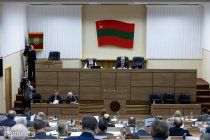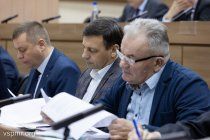 Русский
Русский English
English-







Arbitration Court: results for 2023
The Arbitration Court of the Pridnestrovian Moldavian Republic is the highest judicial body for the resolution of economic and property disputes, for the consideration of cases related to the implementation of entrepreneurial and other economic activities, including those related to bankruptcy. The report on the results of the Arbitration Court’s activities for 2023 was presented to the deputies of the Supreme Council in the course of the a plenary meeting by its head Alexander Kiyko.
The information provided notes that last year the Arbitration Court received 1189 claims and applications for consideration. The figure increased by 34% compared to 2022. All applications were considered on time, as in previous years. The average caseload for trial judges was 14 cases per judge per month (11 cases in 2022). The Chairman of the Arbitration Court drew attention of deputies to an important factor that has a significant impact on the work of the Arbitration Court.
He noted that the workload on judges has increased. It is necessary to solve the problem to increase the number of judges within the staffing table, the Chairman of the Arbitration Court considers.
The report provides statistical data on cases examined in 2023. Consideration of property disputes is one of the main activities of the court. 196 decisions and 71 rulings were made in such cases last year.
Decisions were made on 622 disputes arising from administrative and other public legal relations in 2023, which is 34.4% more than in 2022. For example, the number of cases on bringing to administrative responsibility, challenging decisions of administrative bodies on bringing to administrative responsibility, collecting debts to the budget for taxes and other obligatory payments to the budget and state extra-budgetary funds has increased, the number of cases challenging non-normative legal acts, decisions and actions (inaction) of state authorities, local governments.
The number of insolvency (bankruptcy) cases without initiating bankruptcy proceedings has decreased. 70 such cases were considered in 2023, which is 33.3% less than in 2022. Bankruptcy proceedings were completed in 14 cases of insolvency (bankruptcy) with the initiation of bankruptcy proceedings in 2023, according to the report.
131 cassation appeals were received against the decisions and rulings made by the Arbitration Court. The number of complaints decreased by 22% compared to the previous year (168 complaints were received in 2022).
Information about court hearings scheduled for hearing was posted on the website of the Arbitration Court every week as well as a table of cases of insolvency (bankruptcy) of legal entities being processed by the Arbitration Court, and current information on each case was indicated.
Deputies of the Supreme Council asked questions of interest when discussing the report of the Chairman of the PMR Arbitration Court. Deputy Speaker of Parliament and Chairman of the Legislation Committee Galina Antyufeyeva was interested in why the number of cases of bringing to administrative responsibility last year increased (+ 93 cases, which amounted to 394 cases), and the amount to be recovered decreased according to the results of last year.
Alexander Kiyko explained that some administrative offenses provide for the possibility of punishment not related to the imposition of financial sanctions, for example, a warning, depending on the presence of one or another sign, mitigating or aggravating, appropriate decisions are made.
As for improving legislation, the Arbitration Court submitted for consideration to the Supreme Council the legislations “On Amendments to the Arbitration Procedural Code of the PMR” and “On Amendments to the PMR Law “On State Duty” last year. The amendments were initiated in order to eliminate the gap in procedural legislation, to update the list of claims and statements that are paid as a state fee when applying to the Arbitration Court.
The Committee on Legislation, Protection of Rights and Freedoms of Citizens expressed hope for closer cooperation between the Arbitration Court and the Supreme Council to eliminate shortcomings and improve current legislation by implementing the right of legislative initiative by the Arbitration Court of the Pridnestrovian Moldavian Republic.
The Supreme Council took note of the information presented by the Arbitration Court and voted for the corresponding Parliamentary Resolution.




